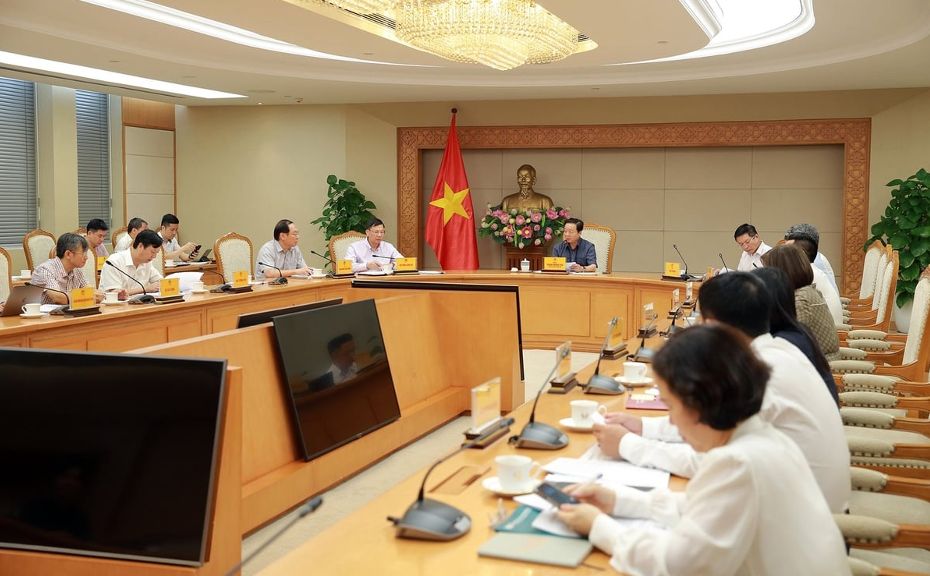Deputy Prime Minister Tran Hong Ha has requested that the Ministry of Agriculture and Environment comprehensively supervise all mechanisms and policies related to carbon credits to ensure the market operates transparently.
At a meeting on September 9 regarding the draft decree for a domestic carbon exchange, Deputy Prime Minister Tran Hong Ha emphasized that after years of preparation, Vietnam must now transition to substantive action.
"For many years, we have made technical and legal preparations, but the key is to have a market with real supply and demand, where businesses see the benefits of investing in technological innovation and governance to reduce emissions," he stated. He also warned, "Nations that prepare well will proactively seize and calculate their benefits. Conversely, those who are slow will be passive, even disadvantaged".
 Deputy Prime Minister Tran Hong Ha chairs a meeting on September 9 to review progress on the draft decree for a domestic carbon credit exchange.
Deputy Prime Minister Tran Hong Ha chairs a meeting on September 9 to review progress on the draft decree for a domestic carbon credit exchange.According to the Deputy Prime Minister, the carbon market is not only an environmental protection tool but also an economic component that creates new resources for green growth, helping Vietnamese enterprises integrate more deeply into the global supply chain.
Tasked with leading the implementation, the Ministry of Agriculture and Environment is developing a Carbon Market Development Plan to 2030 with several key tasks: completing the legal framework, establishing a Measurement, Reporting, and Verification (MRV) system, issuing standards for carbon credits, and preparing transaction infrastructure.
Deputy Minister Le Cong Thanh stated that the Ministry will work closely with other ministries and sectors to ensure progress. He also highlighted the potential of agriculture and forestry, two sectors that could become "gold mines" for carbon credits due to their advantages in emissions reduction and CO₂ absorption.
According to him, sustainable rice cultivation practices, livestock waste treatment, afforestation, and sustainable forest management can generate a large volume of carbon credits, contributing to both emissions reduction and increased income for farmers and businesses.
In parallel, the Ministry of Finance is urgently drafting a decree on the development and management of the domestic carbon market, expected to be submitted to the government for issuance in 2025. This decree will detail the operating mechanism of the carbon credit exchange, certification standards, transparency control mechanisms, and financial policies to support business participation. It is considered the legal "backbone" that will enable the Ministry of Agriculture and Environment and other agencies to implement technical aspects, from emissions inventories to credit certification. The involvement of the Ministry of Finance also underscores the interdisciplinary nature of the carbon market, requiring close coordination between resource and environmental management and financial-economic policy.
Currently, agriculture accounts for about one-third of the country's total greenhouse gas emissions, with rice production alone contributing nearly half. Therefore, the Ministry of Agriculture and Environment is promoting water-saving farming models, reducing the use of chemical fertilizers, and encouraging the reuse of agricultural by-products.
Simultaneously, with over 14.7 million hectares of forest, Vietnam has a significant advantage in carbon absorption and storage. REDD+ (Reducing Emissions from Deforestation and Forest Degradation) projects are being implemented in many localities, promising a stable supply of carbon credits.
Several businesses and cooperatives participating in pilot programs have noted that if the carbon market operates effectively, they will have additional financial resources to reinvest in green production, thereby increasing income while meeting the export standards of demanding markets.
Deputy Prime Minister Tran Hong Ha has requested that the Ministry of Agriculture and Environment comprehensively supervise all mechanisms and policies related to carbon credits to ensure the market operates transparently, prevents fraud, and reasonably regulates supply and demand so that businesses see tangible benefits in participating.
A current challenge is the lack of synchronization in the national emissions data system. The Ministry of Agriculture and Environment is urgently completing the database, applying digital technology and satellites to accurately monitor emissions and absorption. This forms the foundation for certifying carbon credits and strengthening investor confidence.
The next important goal is to connect Vietnam's carbon market with the global mechanism under Article 6 of the Paris Agreement. This would allow Vietnamese carbon credits to be sold internationally at high value, creating additional financial resources to promote the green transition.
A representative from the World Bank in Vietnam remarked that if Vietnam successfully builds a transparent and internationally connected carbon market, it will be a major boost for its green transition process and attract new investment flows.
The carbon market is not only an international responsibility for Vietnam in reducing greenhouse gas emissions but also an opportunity to restructure the economy towards a green and circular model. With strong political will and close government direction, Vietnam has a solid basis to form and operate a domestic carbon market in the near future, aiming for the goal of net-zero emissions by 2050.